Themes
Analysts of the book have primarily focused on themes of power and language use, particularly as it relates to marginalized people. In 1994 Patrick McGrath of The New York Times claimed that one of Coetzee's central themes throughout his body of work is the "linkage of language and power, the idea that those without voices cease to signify, figuratively and literally"; McGrath pointed to Foe as the "most explicit expression" of that theme. [1] Barton longs to tell her own story, but lacks the language to do so in a way that the public will accept. The agent she chooses to help give her the words necessary to communicate persists in erasing her history, by minimizing what she perceives as important and supplanting her remembered facts with adventurous fiction. As Foe takes over her tale, McGrath said, Barton "loses her voice in history, and thus her identity." [1]
In addition to trying to preserve herself and her history, Barton is attempting to give voice to the even more graphically silenced Friday. Denis Donoghue of New York University stated that "the political parable [of the novel] issues from Friday's tonguelessness", as one of the central themes of the novel is the imperative to give voice to the oppressed. [2] Barton sees Friday as caught on the edge of birth by his speechlessness, though she believes that his desire for liberation is explicit, if unspoken; Foe – though wondering if those who are not speechless "are secretly grateful" for the opportunity to project their thoughts onto Friday – believes that Friday could overcome his speechlessness by learning to write. [2] While the book depicts the struggle to control text, Donoghue concludes that the undefined narrator of the book's finale (which Sam Durrant in "J. M. Coetzee, Elizabeth Costello and the Limits of the Sympathetic Imagination" pointed out could only have been written after the deaths of Barton and Defoe) [3] is "the voice of the poetic imagination, its sympathies expanding beyond all systems to reach the defeated, the silenced…" [2] Friday is afforded a final opportunity to tell his story, but can only communicate through the release of bubbles from his waterlogged corpse, a communication which neither the narrator nor the reader can interpret.
David Attwell in J.M. Coetzee: South Africa and the Politics of Writing saw this inability of a silenced black character to communicate as central to the book, indicating that "Friday's enforced silence represents what a monocultural, metropolitan discourse cannot hear". [4] South African writer Rian Malan also felt the racial gap was key, describing Foe as "the most profound book ever written about race relations in a society where whites were often separated from blacks by an abyss of linguistic and cultural incomprehension." [5] When Malan interviewed Coetzee for Time magazine, he questioned the writer about this theme, who only replied, "I would not wish to deny you your reading." [5] Professor Manju Jaidka of Panjab University, Chandigarh noted that Barton, as a woman in a very masculine text, in herself represents "the minority, the marginalised, or the silenced other." [6] Jane Poyner in J.M. Coetzee and the Idea of the Public Intellectual highlighted the inherent tension in Barton's role, as she simultaneously struggles against the efforts of Foe to appropriate and misrepresent her story and unintentionally "'colonizes' Friday's story" herself as she interprets his silence. [7]
Critical reception
Foe attracted criticism in South Africa upon its publication. According to Michael Marais in "Death and the Space of the Response of the Other in J.M. Coetzee's The Master of Petersburg", Foe met "acrimony, even dismay" at the time of its publication, as one of South Africa's "most prominent authors" seemed to turn his attention from compelling events in South Africa to "writing about the writing of a somewhat pedestrian eighteenth century novelist." [8] In detailing that receipt, Marais quotes Michael Chapman in "Writing of Politics" as typical with his dismissive comment: "In our knowledge of the human suffering on our own doorstep of thousands of detainees who are denied recourse to the rule of law, Foe does not so much speak to Africa as provide a kind of masturbatory release, in this country, for the Europeanising dreams of an intellectual coterie" [9] Attwell, however, noted in 2003 that the novel is contextualized to Africa by the transformation of Friday from a Carib who looked nearly European to an African. [10]
In the United States, reception was less politically charged. The novel received a positive review in The New York Times, where Michiko Kakutani praised the writing as "lucid and precise; the landscape depicted, mythic yet specific", concluding that "the novel - which remains somewhat solipsistically concerned with literature and its consequences - lacks the fierceness and moral resonance of Waiting for the Barbarians and Life and Times of Michael K , and yet it stands, nonetheless, as a finely honed testament to its author's intelligence, imagination and skill." [11] Andrew O'Hehir for Salon described the novel as "a bit dry". [12] In his review for Time, Stefan Kanfer questions the impact of what he describes as an "achingly symbolic retelling", suggesting that readers may be more self-congratulatory for discovering the author's "brilliantly disguised" themes than moved by "urgencies that are neither fresh nor illumined." [13]

Daniel Defoe was an English novelist, journalist, merchant, pamphleteer and spy. He is most famous for his novel Robinson Crusoe, published in 1719, which is claimed to be second only to the Bible in its number of translations. He has been seen as one of the earliest proponents of the English novel, and helped to popularise the form in Britain with others such as Aphra Behn and Samuel Richardson. Defoe wrote many political tracts, was often in trouble with the authorities, and spent a period in prison. Intellectuals and political leaders paid attention to his fresh ideas and sometimes consulted him.

Robinson Crusoe is an English adventure novel by Daniel Defoe, first published on 25 April 1719. Written with a combination of epistolary, confessional, and didactic forms, the book follows the title character after he is cast away and spends 28 years on a remote tropical desert island near the coasts of Venezuela and Trinidad, encountering cannibals, captives, and mutineers before being rescued. The story has been thought to be based on the life of Alexander Selkirk, a Scottish castaway who lived for four years on a Pacific island called "Más a Tierra" which was renamed Robinson Crusoe Island in 1966. Pedro Serrano is another real-life castaway whose story might have inspired the novel.

The Farther Adventures of Robinson Crusoe is a novel by Daniel Defoe, first published in 1719. Just as in its significantly more popular predecessor, Robinson Crusoe (1719), the first edition credits the work's fictional protagonist Robinson Crusoe as its author. It was published under the considerably longer original title: The Farther Adventures of Robinson Crusoe; Being the Second and Last Part of His Life, And of the Strange Surprising Accounts of his Travels Round three Parts of the Globe. Although intended to be the last Crusoe tale, the novel is followed by a non-fiction book involving Crusoe by Defoe entitled Serious Reflections During the Life and Surprising Adventures of Robinson Crusoe: With his Vision of the Angelick World (1720).
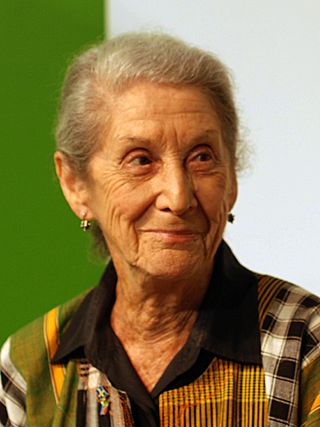
Nadine Gordimer was a South African writer and political activist. She received the Nobel Prize in Literature in 1991, recognised as a writer "who through her magnificent epic writing has ... been of very great benefit to humanity".
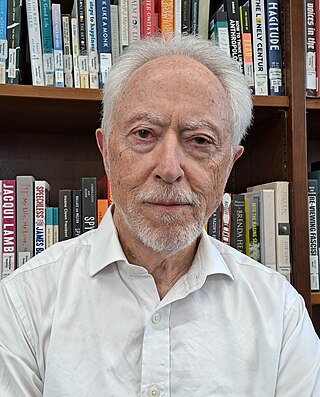
John Maxwell Coetzee FRSL OMG is a South African and Australian novelist, essayist, linguist, translator and recipient of the 2003 Nobel Prize in Literature. He is one of the most critically acclaimed and decorated authors in the English language. He has won the Booker Prize (twice), the CNA Literary Award (thrice), the Jerusalem Prize, the Prix Femina étranger, and The Irish Times International Fiction Prize, and holds a number of other awards and honorary doctorates.
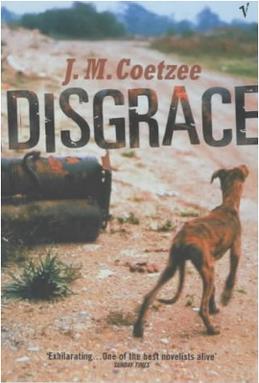
Disgrace is a novel by J. M. Coetzee, published in 1999. It won the Booker Prize. The writer was also awarded the Nobel Prize in Literature four years after its publication.
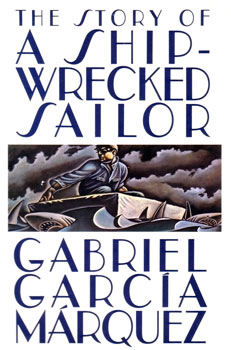
The Story of a Shipwrecked Sailor is a work of non-fiction by Colombian writer Gabriel García Márquez. The full title is The Story of a Shipwrecked Sailor: Who Drifted on a Liferaft for Ten Days Without Food or Water, Was Proclaimed a National Hero, Kissed by Beauty Queens, Made Rich Through Publicity, and Then Spurned by the Government and Forgotten for All Time.

Friday is one of the main characters of Daniel Defoe's 1719 novel Robinson Crusoe and its sequel The Farther Adventures of Robinson Crusoe. Robinson Crusoe names the man Friday, with whom he cannot at first communicate, because they first meet on that day. The character is the source of the expression "Man Friday", used to describe a male personal assistant or servant, especially one who is particularly competent or loyal.
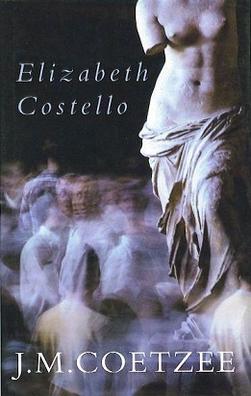
Elizabeth Costello is a 2003 novel by South African-born Nobel Laureate J. M. Coetzee.
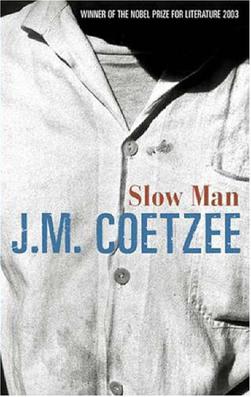
Slow Man is a novel by the South-African writer J.M. Coetzee and concerns a man who must learn to adapt after losing a leg in a road accident. The novel has many varied themes, including the nature of care, the relationship between an author and his characters, and man's drive to leave a legacy. It was Coetzee's first novel since winning the Nobel Prize in Literature in 2003. The novel was longlisted for the 2005 Man Booker Prize.

Robinson Crusoé is an opéra comique with music by Jacques Offenbach and words by Eugène Cormon and Hector-Jonathan Crémieux. It premiered in Paris on 23 November 1867.

Dusklands (1974) is the debut novel by J. M. Coetzee, winner of the 2003 Nobel Prize in Literature. The novel consists of two separate stories, "The Vietnam Project" and "The Narrative of Jacobus Coetzee."

In the Heart of the Country (1977) is an early novel by South African-born writer J. M. Coetzee. The book is one of Coetzee's more experimental novels and is narrated through 266 numbered paragraphs rather than chapters.

Robinson Crusoe is a 1954 adventure film directed by Luis Buñuel, based on the 1719 novel of the same name by Daniel Defoe. It stars Dan O'Herlihy as Crusoe and Jaime Fernández as Friday. Both English and Spanish versions were produced, making it Buñuel's first English-language film.

Crusoe is an adventure-drama television series, based loosely on the 1719 novel Robinson Crusoe by Daniel Defoe. The series' 13 episodes aired on NBC from October 17, 2008, to January 31, 2009, during the first half of the 2008–09 television season. It follows the adventures of Robinson Crusoe: a man who has been shipwrecked on an island for six years and is desperate to return home to his wife and children. His lone companion is Friday, a native whom Crusoe rescued and taught English.

Summertime is a 2009 novel by South African-born Nobel laureate J. M. Coetzee. It is the third and final instalment of Scenes from Provincial Life, a series of fictionalized memoirs by Coetzee and details the life of one John Coetzee from the perspective of five people who have known him.
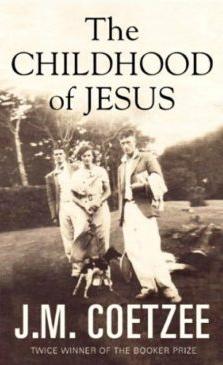
The Childhood of Jesus is a 2013 novel by South African-born Australian Nobel laureate J. M. Coetzee.
J. M. Coetzee is a South African-born novelist, essayist, linguist, translator and recipient of the 2003 Nobel Prize in Literature. He has also won the Booker Prize twice, the Jerusalem Prize, CNA Prize (thrice), the Prix Femina étranger, the Irish Times International Fiction Prize, as well as many other awards and honours, and he holds a number of honorary doctorates and is one of the most acclaimed and decorated authors in the English language.

Robinson is the second novel by Muriel Spark, first published by Macmillan in 1958 and in the US by Lippincott, and is unusual within her body of work in being written in the first person. The novel is set in 1954 and begins with 29 people on a plane bound for Azores and then Lisbon that crashes on a remote island in the North Atlantic, killing all the crew and most of the passengers. The narrator, January Marlow, and two other survivors, are nursed by Robinson, a mysterious loner already in residence on the island. As the novel progresses, their physical health returns, but the mental health of the characters is tested by the extreme circumstances. For rescue, they await the coming of the boat that will collect the pomegranate crop, the first contact with civilisation since their disappearance. A young boy called Miguel and a cat called Bluebell flesh out the cast list.

The 2003 Nobel Prize in Literature was awarded to the South African novelist John Maxwell Coetzee, better known simply as J. M. Coetzee, "who in innumerable guises portrays the surprising involvement of the outsider." He is the fourth African writer to be so honoured and the second South African after Nadine Gordimer in 1991.


















